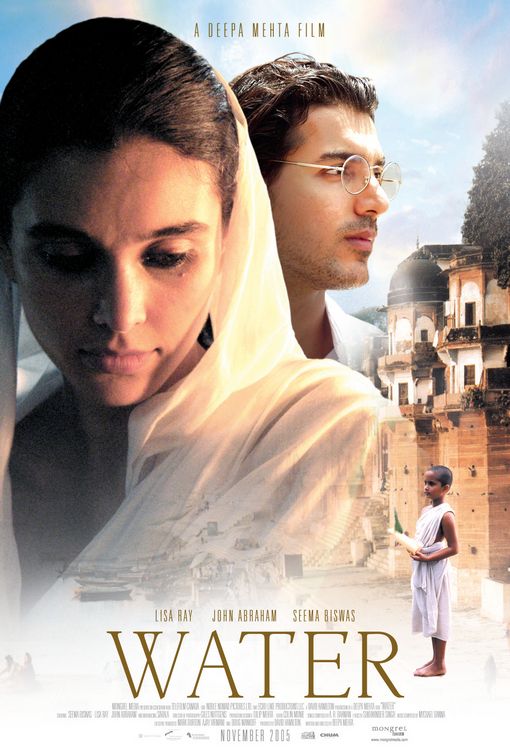“Elemental Drama”

| None | Light | Moderate | Heavy | |
|---|---|---|---|---|
| Language | ||||
| Violence | ||||
| Sex | ||||
| Nudity |
What You Need To Know:
WATER is a skillfully crafted movie. The story’s glimpse into the world of an Indian widow house is marred by tragedy, but also sprinkled with moments of hope. Visually, WATER contains grand depictions of the stunning Sri Lanka landscape, and the movie’s score is immaculate. Although skillfully made, however, adult viewers should be cautioned that the movie contains many troublesome elements, including a light Romantic worldview, depictions of people praying to Krishna, talk of prostitution, and suicide.
Content:
(Ro, FR, B, L, V, N, D, M) Light Romantic worldview in which characters seek escapism from oppressive false religious practices through emotions, false religious elements in which people pray to Krishna, who is described in one scene as a “god,” though ultimately many Hindu practices are implicitly rebuked, with a few vivid moments of hope and redemption; six obscenities; mild violence depicted when a child bites an adult; no sexual content, although it is mentioned that one character is a prostitute; naturalistic upper male nudity; no alcohol; one scene depicting a woman smoking some sort of drug (perhaps opium); and, lying and suicide.
More Detail:
India was still under British control in 1938, and it was common for older men to marry young girls. A husband’s death would diminish his widow to half-dead status, according to Hindu customs, and her sins from a previous life were believed to have been the cause of his death. As a type of penance, a widow was confined for the remainder of her life in a house called an “ashram,” where she was expected to live a bleak, ascetic lifestyle. The practice was based on a portion of The Laws of Manu, a sacred Hindu text that states, “A widow should be long suffering until death, self-restrained and chaste. A virtuous wife who remains chaste when her husband has died goes to heaven. A woman who is unfaithful to her husband is reborn in the womb of a jackal.”
It’s under these agonizing circumstances that WATER renders the story of Chuyia (Sarala), an eight-year-old widow with little recollection of her marriage, and even less understanding of the new life forced upon her. After the abrupt and unforeseen death of her husband, she finds herself abandoned by her father in the drab environment of an ashram, surrounded by mostly gloomy, aging widows with shaved heads and vacant faces. Chuyia’s presence adds a spark of endearing mischief to the quarters, and her defiance stirs up questions that the older, emotionally-whitewashed widows have long stopped asking.
Chuyia develops a friendship with beautiful widow Kalyani (Lisa Ray), whose hair is kept long so she can support the ashram by practicing the world’s oldest profession. Chuyia introduces Kalyani to observant Gandhi nationalist Narayan (John Abraham), with whom Kalyani falls in love, despite the forbidden nature of such a relationship. Narayan’s love for Kalyani fuels disaster and promise to the widow house, and represents the possibility of escape from their grim existence.
WATER is a skillfully crafted piece of filmmaking. The movie’s slice-of-life glimpse into the world of Indian widow houses, which exist to this day, is a story marred by tragedy, but also sprinkled with moments of hope. Visually, WATER has both the countenance of an epic and the subtle beauty of an attentively-made, detail-laden indie picture, with intimate shots of the Ganges River, India’s emblematic “ghats,” and grand depictions of the stunning Sri Lanka landscape. The movie’s score, a collaboration between composer Mychael Danna (CAPOTE, VANITY FAIR, HULK, THE ICE STORM) and India’s A.R. Rahman, is immaculate. The acting, highlighted by Lisa Ray, is also first-rate.
With a storyline focused on a heartbreaking practice of fundamentalist Hindus, WATER is not an easy movie to watch. Reflective adult Christian viewers may be continually reminded of the freedom found in Christ, which contrasts starkly with the dogmatic oppression onscreen. In this sense, WATER can be an edifying and informative experience for the thoughtful Christian audience.
Viewers should be cautioned, however, that the movie contains many troublesome elements, including a light Romantic worldview, depictions of people praying to Krishna, talk of prostitution, and suicide. MOVIEGUIDE(r) advises extreme caution for adults.


 - Content:
- Content: 



